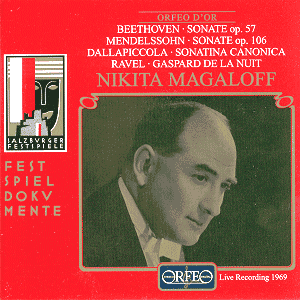Felix MENDELSSOHN (1809-47)
Piano Sonata in B flat, Op.
106.
Luigi DALLAPICCOLA (1904-75)
Sonata canonica sopra Capricci di Nicolò
Paganini.
Ludwig van BEETHOVEN (1770-1827)
Piano Sonata No. 23 in F minor, Op. 57,
'Appassionata'
Maurice RAVEL (1875-1937)
Gaspard de la
nuit.
 Nikita Magaloff
(piano).
Nikita Magaloff
(piano).
 Orfeo C531001B [mono]
[ADD]
[66'55]
Orfeo C531001B [mono]
[ADD]
[66'55]
Crotchet

This live recital from the Salzburg Festival (given in the Mozarteum on August
7th, 1969) presents a marvellously varied programme and an opportunity
to revel in some truly magnificent pianism. Magaloff, born in 1912, was a
virtuoso of the old school, including amongst his teachers such luminaries
as Alexander Ziloti (a Liszt pupil) and Isidor Philipp (who studied with
a pupil of Chopin). Furthermore, Magaloff studied composition with Prokofiev
and Ravel acted as a mentor, encouraging him to explore the music of his
time. Perhaps best known now for his massive undertaking of recording the
complete works of Chopin (thirteen discs, Philips 456 376-2), this Orfeo
disc helps to expand the picture somewhat by including Dallapiccola's 1943
Sonata canonica as well as more familiar fare.
The Mendelssohn sonata is a lovely, assured piece, and Magaloff will not
fail to delight. In particular, he gives the Scherzo a Midsummer Night's
Dream lightness. His advocacy is never in doubt, and there is an energy
continuously inherent in his playing that is completely apt. He understands
Mendelssohn's musical processes seemingly instinctively. To play simply is
one of the pianist's great challenges, and it is one to which Magaloff rises,
superbly and delightfully.
Dallapiccola's Sonata canonica takes Paganini's violin Caprices as
a starting point, dragging them into the twentieth century. Again, Magaloff's
wit will win many friends for this piece (and maybe encourage further exploration
into this fascination composer's output?). He actually uses a similar light
touch to that used in the Mendelssohn, but here he can also be relentless
and hard when need be.
The two final pieces are much more familiar territory. Magaloff's
Appassionata is an impulsive, roller-coaster ride which must have
had the audience on the edge of their seats at the time: they do not hold
back their enthusiasm at the end. What handfuls of notes there are only reinforce
the fact that this is a live event - they are not frequent enough to seriously
distract the listener. Magaloff's ear for harmonic colour and - importantly
- meaning is fascinating and breathtaking at the same time. The final movement
is on the fast side, and what impresses most is Magaloff's tremendously strong
right hand. The articulation is crystal clear.
Few composers would seem better suited to a colouristic approach than Ravel.
Magaloff invokes the atmospheres in the most evocative of fashions (the tracery
of Ondine is wonderfully delicate), but it is the virtuosity of
Scarbo that lingers in the mind and places this version alongside
the best (Pogorelich's studio account is always a good yard-stick in this
piece: coupled with Prokofiev's Sixth Piano Sonata on DG 413 363-2).
This recital is required listening for all pianophiles. Magaloff's range
and control of tone colour is astounding, his musicianship is never in doubt
and his technical control is inspiring. The recording is excellent for its
age.
Colin Clarke
Performance

Recording


